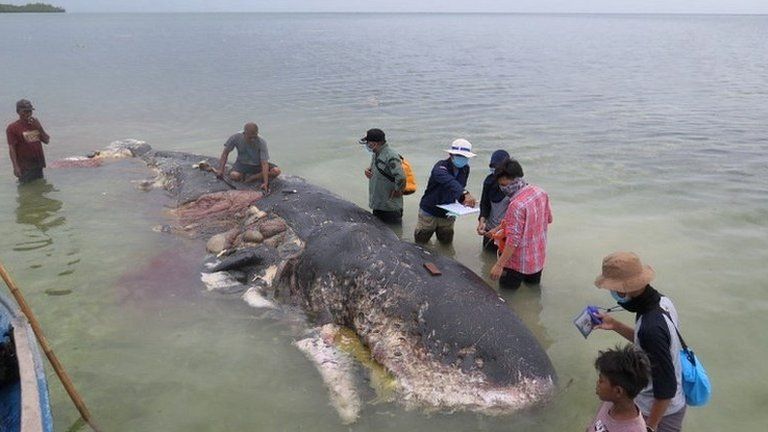Dead sperm whale found in Indonesia had ingested '6kg of plastic'
- Published

A dead sperm whale that washed ashore in a national park in Indonesia had nearly 6kg (13 lbs) of plastic waste in its stomach, park officials say.
Items found included 115 drinking cups, four plastic bottles, 25 plastic bags and two flip-flops.
The carcass of the 9.5m (31ft) mammal was found in waters near Kapota Island in the Wakatobi National Park late on Monday.
The discovery has caused consternation among environmentalists.
"Although we have not been able to deduce the cause of death, the facts that we see are truly awful," Dwi Suprapti, a marine species conservation co-ordinator at WWF Indonesia, was quoted as saying by the Associated Press.
It was not possible to say whether the plastic had caused the whale's death because of its advanced state of decay, she added.
In a tweet, WWF Indonesia gave the breakdown of what was found inside the animal:
Allow Twitter content?
This article contains content provided by Twitter. We ask for your permission before anything is loaded, as they may be using cookies and other technologies. You may want to read Twitter’s cookie policy, external and privacy policy, external before accepting. To view this content choose ‘accept and continue’.
"Hard plastic (19 pieces, 140g), plastic bottles (4 pieces, 150g), plastic bags (25 pieces, 260g), flip-flops (2 pieces, 270g), pieces of string (3.26kg) & plastic cups (115 pieces, 750g)."
WATCH: Indonesia is pulling the plug on plastic bags
The use of throwaway plastic is a particular problem in some South East Asian countries, including Indonesia.
Five Asian nations - China, Indonesia, the Philippines, Vietnam and Thailand - account for up to 60% of the plastic waste that ends up in oceans, according to a 2015 report by environmental campaigner Ocean Conservancy and the McKinsey Center for Business and Environment.
You may also be interested in:
Plastics bags are believed to kill hundreds of marine animals there each year. In June, a pilot whale died off southern Thailand after swallowing 80 plastic bags.
At the end of last year, the UN said marine life was facing "irreparable damage" from the approximately 10m tonnes of plastic waste ending up in the oceans every year.
- Published2 June 2018
- Published31 October 2018
- Published24 October 2018
- Published25 May 2018
- Published21 March 2018
- Published10 December 2017
- Published23 February 2016